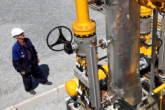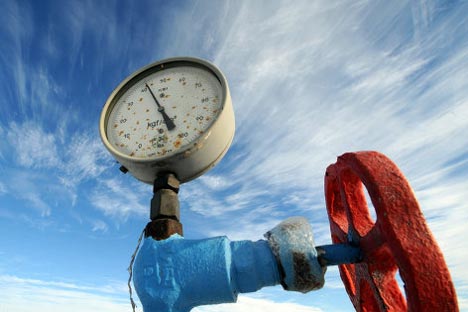TAPI moves closer to centre stage

The project promises to bring together India and Pakistan as stakeholders in the stability and security of Afghanistan, besides building substantial content into the India-Pakistan relationship itself. Source: AP
The Turkmenistan-Afghanistan-Pakistan-India [TAPI] gas pipeline project is once again back in the news and this time around, it is for a positive tiding. The project has crossed a major hurdle last week with the signing of the Contract on Sales and Purchase of the gas between Turkmenistan and Afghanistan, which has been pending. Without doubt, the project has taken a step forward on the practical plane and is moving closer to the centre stage in the region’s energy politics.
Looking ahead at the implementation stage in a conceivable future in months rather than years, India has proposed the setting up of a consortium TAPI Ltd based in Dubai comprising the four participating countries and to scout for a consortium leader to build and operate the project and arrange finances. This followed the unsuccessful “roadshow” by the Asian Development Bank aimed at engaging the interest of Big Oil.
Delhi is also enthused by the willingness of the Turkmen side to consider the Indian request for giving a stake in the gas field that will feed the TAPI. Delhi is pinning hopes on implementing the project by 2017.
Having said that, the main sticking point remains, namely, the security situation in Afghanistan and Pakistan. However, arguably, it is a classic chicken-and-egg situation. On the one hand it might seem that TAPI cannot be implemented due to the fragility of the security situation and a pall of gloom immediately descends. On the other hand, it is precisely projects like the TAPI that can help stabilize the security situation.
It needs to be borne in mind that in the 1990s the Taliban leadership was manifestly keen on having a Turkmen gas pipeline built by UNOCAL via Afghanistan to Pakistan (and India). There is no conceivable reason why the Taliban should be hostile toward the TAPI project at this point in time. The project will earn revenue for Afghanistan and it meets Pakistan’s acute needs for energy aside earning for it a handsome amount as transit fee from India.
Related:

Dragon dance on Central Asia’s energy turf
Connectivity would foster integration of Eurasia
TAPI pipeline project “not doable” for security reasons - expert
Over and above, the project promises to bring together India and Pakistan as stakeholders in the stability and security of Afghanistan, besides building substantial content into the India-Pakistan relationship itself. The Indian and Pakistani leaderships are moving steadily towards a resumption of their dialogue for improving relations. In an interview recently, External Affairs Minister Salman Khurshid hinted at the likelihood of a visit by the Indian Prime Minister Manmohan Singh to Pakistan. The new Pakistani leadership of Prime Minister Nawaz Sharif has repeatedly flagged keenness to have a cooperative relationship with India. Energy cooperation has been mooted as a priority area.
The Indian officials hope that the company building the pipeline will be from a “neutral” country. Who could this “neutral” country be? Russia, of course, is eminently qualified to fit the description, having friendly ties with all the four participating countries. Gazprom had evinced interest in the TAPI at one time.
All rights reserved by Rossiyskaya Gazeta.
Subscribe
to our newsletter!
Get the week's best stories straight to your inbox
